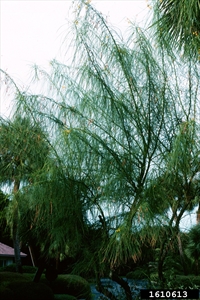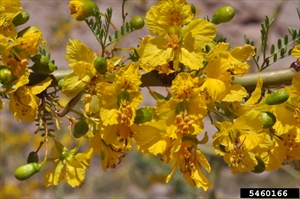Jerusalem thorn; It is also known as Barbados flower-fence, horse bean, jelly bean tree, or parkinsonia.
Pacific Pests, Pathogens, Weeds & Pesticides - Online edition
Pacific Pests, Pathogens, Weeds & Pesticides
Jerusalem thorn (442)
Parkinsonia aculeata. It was known previously as Mimosa bimocronata. It is a member of the Fabaceae.
Africa, Asia, North, South and Central America, the Caribbean, Europe, Oceania. It is recorded from Australia, Federated States of Micronesia, Guam, and New Caledonia.
It is native to southern North America, northern Mexico, the Galapagos Islands and northern South America.
An important weed in some Pacific island countries. Invasive in hot regions (sub-humid and arid), and has become naturalised and weedy everywhere, whether native or introduced. Jerusalem thorn is mostly found growing near creeks, rivers, bores and dams in semi-arid regions (especially those with a distinctive wet and dry season). It also colonises grasslands, open woodlands, rangelands, pastures, waste areas, disturbed sites and roadsides. It can grow up to1500 masl. Its invasive weediness is related to the production of large amounts of seeds and ability to tolerate a wide range of soils, including those seasonally flooded.
Jerusalem thorn is an upright spiny shrub or small tree often forming dense thickets. It can grow to 8 m, but more commonly is between 2-6 m (Photo 1). It can be single or multi-stemmed. The smooth, green stems are slender and tend to droop and zig-zag (Photo 2). Young stems have a pair of spines, 3-20 mm long, below each leaf. Leaves with flat, green, leaf stalk, up to 30 cm long and 2–3 mm wide, with numerous small, 4–10 mm, green, oblong leaflets staggered along both sides (Photos 3&4).
Flowers about 20 mm across with four yellow petals and one erect orange or orange-spotted petal (Photos 5&6). Seed pods, 30–130 mm long, straight with bulges around seeds and points on both ends; they are straw-brown when ripe. Generally, pods contain 1-4 seeds, but occasionally up to 11. Seeds are olive-green to brown and oblong, 10 mm by 4 mm. The roots are mostly shallow.
Jerusalem thorn reproduces mainly by seed, but can also produce suckers (particularly after it has been damaged). The seeds are spread by birds and other animals, especially cattle, and seed pods float in water and can be carried from upper catchment areas downstream. Also carried long distances in mud on animals and vehicles. One tree can produce more than 5000 seeds per year.
A serious pest in many countries. It is one of Australia's worse weeds, and is a problem in tropical Africa, Hawaii and other Pacific island countries. Impacts are both environmental and economic. Effects upon livestock grazing are considerable in Australia due to competition with forage grasses, blocking access to water sources, damage to hooves and the consequences from infected sores. Thickets of the tree are also home to feral animals, pigs in particular. Detailed economic assessments are lacking.
Often introduced as a fodder tree, for hedging, shade, wind-breaks or as an ornamental able to tolerate dry and saline sites and waterlogging. Seeds are rich in protein and are eaten. Medicinal properties are reported.
AUTHORS Grahame Jackson & Aradhana Deesh
Adapted from Parkinsonia (Parkinsonia aculeata) (2018) Weeds of SE Qld and Northern NSW. Lucidcentral. (https://www.lucidcentral.org/editors-pick-animal-and-plant-identification-keys/key-to-weeds-of-se-qld-and-northern-nsw); and additional information from Parkinsonia aculata. Wikipedia. (https://en.wikipedia.org/wiki/Parkinsonia_aculeata); and CHAH (2020) Parkinsonia aculeata L. Parkinsonia. WeedsAustralia - Profiles. Department of Sustainability, Environment, Water, Population and Communitie. (https://profiles.ala.org.au/opus/weeds-australia/profile/Parkinsonia%20aculeata); and Parkinsonia: declared pest (2019) Department of Primary Industries and Regional Development. Government of Western Australia. (https://www.agric.wa.gov.au/declared-plants/parkinsonia-declared-pest); and from DAF (2020) Parkinsonia Jerusalem thorn or jelly bean tree Parkinsonia aculeata. Queensland Government. (https://www.daf.qld.gov.au/__data/assets/pdf_file/0014/55040/parkinsonia.pdf). Photo 1 Hectonichus Parkinsonia aculeata - Athens, Greece; Photo 2 John Ruter, University of Georgia, Bugwood.org; Photos 3&4 Karen A. Rawlins, University of Georgia, Bugwood.org; Photos 5&6 William M. Ciesla, Forest Health Management International, Bugwood. org.
Produced with support from the Australian Centre for International Agricultural Research under project HORT/2016/185: Responding to emerging pest and disease threats to horticulture in the Pacific islands, implemented by the University of Queensland, in association with the Pacific Community and Koronivia Research Station, Ministry of Agriculture, Fiji.









